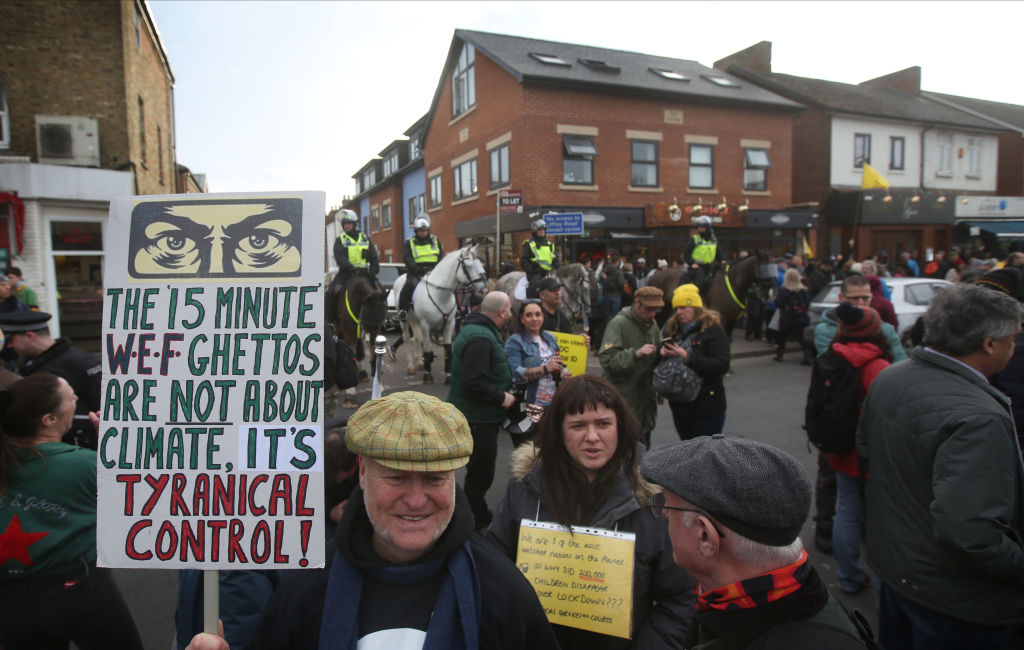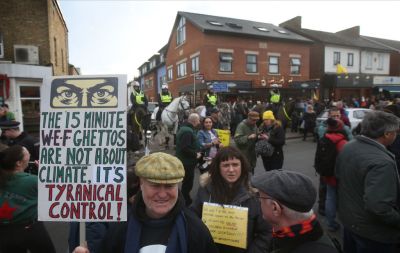A photo of a billboard in the Canadian capital of Ottawa is circulating online with captions claiming the billboard advertises government plans to enforce lockdowns within a 15-minute walking distance of residents’ homes. These claims are false.
The billboard in question advertises the construction of a “15-minute city” development by a private developer, Brigil. The idea of the 15-minute city, which has been endorsed by Ottawa’s city government, has nothing to do with enforcing “new ‘Covid lockdowns,’” “climate checkpoints,” or the confinement of residents within a 15-minute walk of their homes, as some social media users have suggested.
The idea of the 15-minute city was formulated in 2016 by professor Carlos Moreno at the Sorbonne in Paris in the context of urban planning. In 2021 Moreno won an Obel Award, one of the largest prizes in architecture, for his concept. As the official website for the Obel Award defines it:
The term covers an urban theory and an urban model that cities can use to ensure that all residents are able to access their daily needs (work, housing, food, health, education, and culture and leisure) within the distance of a 15-minute walk or bike ride.
Moreno’s idea has been adopted in several cities, including Paris, without any observed attempt by municipal authorities or developers to control the comings and goings of residents. Nonetheless, his idea has proven to be a magnet for conspiracy theorists.
Moreno himself has addressed the conspiracy theories that have surrounded his work in a recent interview with Forbes:
“Their lies are enormous,” he exclaims.
“You will be locked in your neighborhood; cameras will signal who can go out; if your mother lives in another neighborhood, you will have to ask for permission to see her and so on.”
He adds, in disgust, they “sometimes post pictures of concentration camps.”
“The conspiracists see a big global agreement,” he says.
“As the UN-Habitat, the World Economic Forum, the C40 Global Cities Climate Network, and the Federation of United Local Governments, among others, have supported the [15-minute-city] concept, it feeds their fantasies that I am involved in the ‘invisible leadership’ of the world.”
The municipal government of Ottawa’s description of the 15-minute city makes no mention of plans to control or restrict travel by force:
15-minute neighbourhoods are compact, well-connected places with a clustering of a diverse mix of land-uses; this includes a range of housing types, shops, services, local access to food, schools and day care facilities, employment, greenspaces, parks and pathways. They are complete communities that support active transportation and transit, reduce car dependency, and enable people to live car-light or car free.
If you have a claim you would like to see us fact check, please send us an email at factcheck@thedispatch.com. If you would like to suggest a correction to this piece or any other Dispatch article, please email corrections@thedispatch.com.






Please note that we at The Dispatch hold ourselves, our work, and our commenters to a higher standard than other places on the internet. We welcome comments that foster genuine debate or discussion—including comments critical of us or our work—but responses that include ad hominem attacks on fellow Dispatch members or are intended to stoke fear and anger may be moderated.
With your membership, you only have the ability to comment on The Morning Dispatch articles. Consider upgrading to join the conversation everywhere.